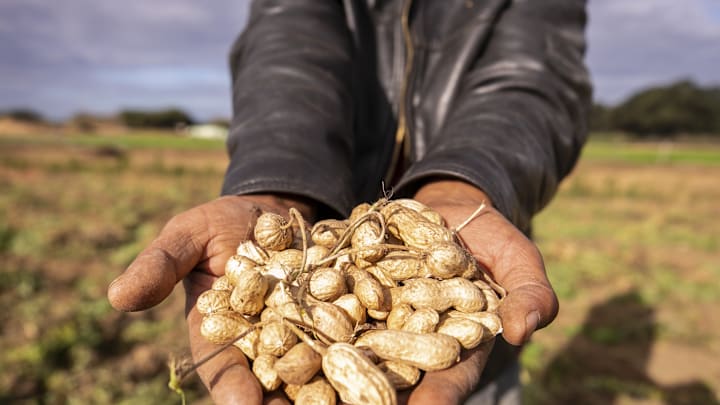There have been numerous myths about nut consumption circulating throughout the years. While those with nut allergies must avoid them at all costs, some people steer clear because they believe they're unhealthy or will make them gain weight. However, nothing could be further from the truth.
Like anything, eating nuts in moderation is what counts. Not all nuts are created equal when it comes to their nutritional profiles, but munching on a handful of almonds or walnuts can prevent several health problems.
Here's what recent studies actually say about eating nuts and recommendations for how many you should eat every day.
6 Myths About Nut Consumption
Whatever you've heard about nuts, keep an open mind — most of the time, you've been misinformed. Here are six truths about eating nuts according to science.
1. Myth: Nuts Cause Weight Gain
One of the biggest myths about nut consumption is it makes you gain weight. Well, experts have recently proven otherwise. Perhaps surprising to some people, eating nuts can boost your metabolism and leave you feeling satiated longer — meaning you're less likely to overeat or reach for junk food. They're also suitable for weight management.
As people embark on their weight loss journeys in 2024, many have decided to try plant-based diets. Vegetarianism has several health benefits and allows you to save one-third of your budget on groceries. However, nuts are an important part of plant-based eating, providing essential nutrients and protein for strong and healthy bodies.
2. Myth: Nuts Are Only Good As Salad Toppings
Many people eat nuts as a snack or toss them over a salad, but there are many other ways you and others can enjoy them. Stir them into a carrot cake batter, blend them into soups and sauces, or create delicious pestos using nuts and herbs.
You can even coat them in different seasonings and give them as gifts. For example, cinnamon sugar candied walnuts bake quickly in the oven. Make a large batch of 16 servings and wrap them in cellophane bags for friends and family.
3. Myth: Nut Franchises Have Few Opportunities for Success
One might think large nut facilities are the only businesses making money, but smaller franchises have plenty of success, too. Have you ever seen a vendor selling nuts at a baseball game or fair? You can invest in a nut franchise for as little as $15,000 or millions, depending on your chosen company.
For instance, most people invest $65,000-$227,000 for a Totally Nutz franchise. Totally Nutz had 14 venues set up at the 2002 Olympic Games and was a vendor at the 2003 World Series.
4. Myth: Walnuts Are Best Kept at Room Temperature
You may not like to eat cold walnuts, but one of the most spoken myths about nut consumption is they are best kept at room temperature. In fact, storing shelled walnuts in the refrigerator can make them last six months longer — or up to a year in the freezer — than if you left them out.
Just be sure to seal them in an airtight container to ensure optimal freshness. The less moisture they have, the better they are to eat.
5. Myth: Activated Nuts Are Better for You
"Activating" nuts is when you soak nuts for hours or days before eating them. Although research shows activating legumes and grains reduces phytate levels — which hinders nutrient absorption — the same isn't true for nuts.
In one study, scientists soaked almonds, peanuts, hazelnuts and walnuts to determine whether phytate levels decreased. The changes in concentration were minimal at -12% to +10%, indicating activation wasn't necessary.
6. Myth: Raw Nuts Are More Nutritious Than Roasted Nuts
Believe it or not, raw and roasted nuts have a similar nutritional profile. Take peanuts, for example — one ounce of raw peanuts is 161 calories with 14 grams of fat, 1.3 grams of sugar, 7.3 grams of protein and 2.4 grams of fiber.
The same amount of dry-roasted peanuts is 167 calories with 14.1 grams of fat, 1.4 grams of sugar, 6.9 grams of protein and 2.4 grams of fiber.
The real difference is how dry-roasted nuts are oven-roasted or fried, which could increase some nuts' fat and calorie content. Conversely, raw nuts — while not pre-cooked before packaging — must undergo pasteurization to prevent Salmonella. This exposes them to the chemical propylene oxide — a possible carcinogen.
How Many Nuts Should You Eat?
Did you know nuts can positively affect your cognitive and mental well-being? Most contain ample amounts of selenium and magnesium, which is just as effective as a tricyclic antidepressant, according to research.
Walnuts, almonds and cashews also help strengthen the bladder and pelvic muscles to improve continence. It's little wonder why experts suggest eating more of them.
Because nuts don't cause weight gain, regular consumption is fine. In fact, dietary guidelines recommend eating 30 grams of nuts daily to prevent chronic illnesses. For perspective, 30 grams is about a small handful of nuts in the following amounts:
- 40 peanuts
- 15 cashews
- 20 walnuts halves
- 20-23 almonds
- 30 pistachios
Of course, people's perception of a handful differs — for instance, your hand may be larger than the next person's. Regardless, research shows you can eat more than the recommended amount and still not gain weight.
Time to Go Nuts Over Nuts
Whoever told you nuts were bad was just as misinformed as you. Fortunately, research has repeatedly debunked the myths about nut consumption, highlighting their essential role in a well-balanced diet. Avoid feeling apprehensive or guilty about snacking on them or incorporating them into your meals, as they'll deliver crucial nutrients for better health.
